The jump into cold water, 1995
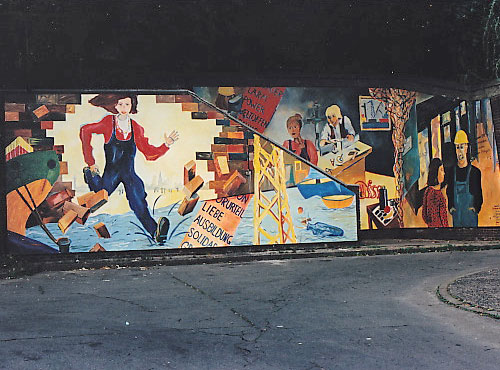
"The jump into cold water"
Große Elbstraße 210-212, Staircase between building XII and XIII.
Design and realisation: 8 girls from the painting class at Hamburg Art Gallery,
under the guidance of Hildegund Schuster.
Sponsors: Claudia Bonnen, Museums Service Hamburg, R&S Baugesellschaft.
Photo: Hildegund Schuster ©
In 2012 the badly damaged picture was replaced by a new one.
The fourth mural of the Women's Open Air Gallery has meanwhile been replaced (see "Girls in view").It is a very special kind of artistic cooperation: it was designed by the eight girls in the painting class at Hamburg Art Gallery, in cooperation with the Museums Service Hamburg under the supervision of artist Hildegund Schuster from Hamburg.
The idea behind the project was to go on a voyage of discovery in the port to look at possible jobs and careers for young women. The intention was to get to know two of the most important companies that have shaped the world of work in the port since the early days of the 19th century. These are the shipyard Schiffswerft Blohm + Voss GmbH and the logistics and transportation company HHLA, Hamburger Hafen und Logistik AG. The project aimed to find out what training schemes these companies offered to young school leavers.
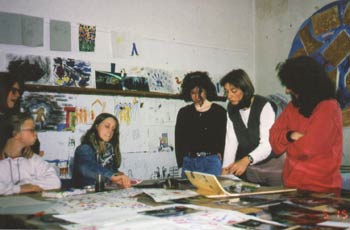
Discussing the design in the
painting class / Hamburg Art Gallery
Photo: Hildegund Schuster ©
For most of the approx. 13 to 15-year old girls, this meant venturing into unknown territory right at the heart of their own city, to find out about the world of work in the port of Hamburg.
Project leader Hildegund Schuster is well-known for innovative projects combining artistic activities with social issues, and she made the initial contacts. They then took the plunge across the river, equipped with cameras and notepads for their research, as their findings would eventually be turned into a joint mural.
These girls were involved: Ayse Celik, Johanna Lemke, Ricarda Petersen, Mascha Strunk, Johanna Schwering, Britta Schröder, Rebecca Sello, Sarah Voss.
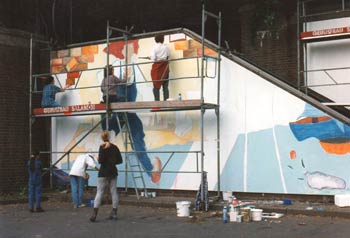
Painting the first bit of wall
Photo: Hildegund Schuster ©
A suitable site for the mural had already been found: right at the heart of the fish market, between buildings XII and XIII, at one of the numerous flights of steps connecting the commercial estate on Große Elbstraße on the north banks of the river with the residential neighbourhoods of Altona located on higher ground. The three flights of steps with their brick walls provided the ideal framework, opening the eyes of anyone going up and down the steps with a vista of unconventional artwork going beyond the usual port nostalgia.
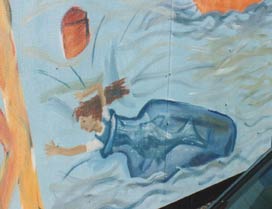
"Nymph in a boiler suit"
Photo:: Hildegund Schuster ©
Taking the plunge from the familiar city surroundings to the unknown territory is illustrated with a large picture of a girl in a boiler suit and bright red shirt. Striding vigorously through the wall, she is seen to be breaking down society's conventional reservations about women working in the port. She is greeted from the river by a nymph, also in a boiler suit, seen to be emerging as the message from an uncorked bottle.
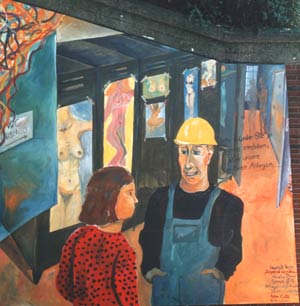
"We'd love to take you on,
but our sanitary facilities ...".
Photo: Hildegund Schuster ©
The pictures on the right show what the young women experienced once they'd crossed the river. On the wall to the right before the steps begin, we see the overture. It tells of the prejudice that women faced when they showed an interest in so-called men's jobs, and how they were put off: "We'd love to take you on, but our sanitary facilities ...", are the words attributed to a port worker. He is shown talking to the young researcher. The background tells its own story, with workers' lockers "decorated" with the pin-ups that were so popular in those days. The words came as an unexpected shock to the girls and they knew this had to go in the mural, together with other comments such as "put a skirt on".
Going up the steps, we see aspects of everyday working situations depicted by a view in the woodworking shop, where dust masks have to be worn at the huge machines. Here there is an amusing scene designed by one of the girls where a pedestal saw is being used to cut out the wooden letters that go in the mural's word strips.
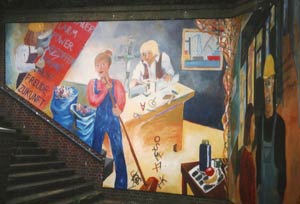
Welder and woodworking shop
Photo: Hildegund Schuster ©
The picture in the foreground shows a still life with a flask and some fruit as a picture of a typical work break. The reality of this situation is linked with an ironic arrangement in the rear corner. Here a fishing net trails from the ceiling to the floor as a consummate statement by the young women of today who see a lot of seamen's yarns being spun here.
As in all the other murals of the Women's Open Air Gallery , here again the word strips give the subtext to the picture, commenting on the individual scenes. We read: prejudice, love, training, solidarity, cosmopolitan, dreams, shift, joy.
The mural suffered greatly from the effects of the wind and the weather; it was also scrawled over by fools who knew no better. The mural is not going to be restored. Since it was produced in 1995, there have been many changes in terms of equality in the workplace, thanks among others to the women's lib movement here in Germany and the impact is has had on individual and social opinions, and on national and European legislation and regulations.
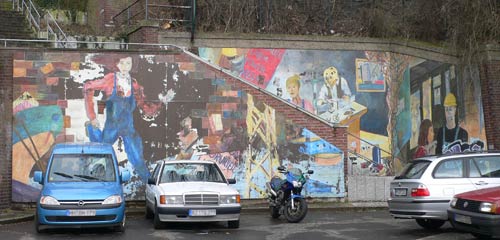
Condition in 2007 - Photo: Hildegund Schuster ©
But there is still a lot to be done, as indicated by a current study: "Three of four companies still have not declared equality to be an explicit corporate objective. 80 percent of companies only provide inadequate resources for equality. This is the result of a global survey".(1)
© Elisabeth von Dücker, 2011
(1) Newsletter of the Federal Initiative for Gender Equality in Business dated April 2010. Read here >>
Picture gallery
Creating and inaugurating the mural
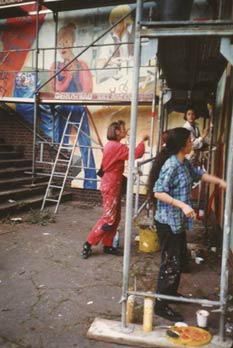
Painting and corrections
Photo: Hildegund Schuster ©
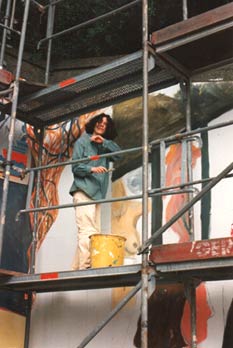
Britta paints the pin-ups
Photo: Hildegund Schuster ©
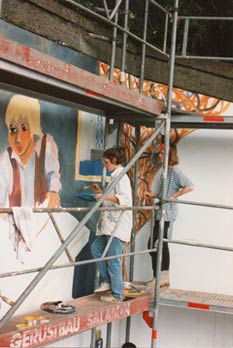
Port atmosphere
Photo: Hildegund Schuster ©
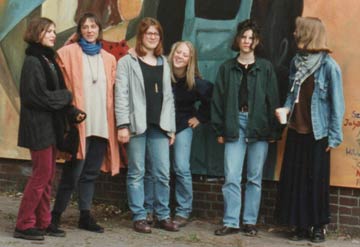
Nearly all painters at the inauguration
Photo: Hildegund Schuster ©
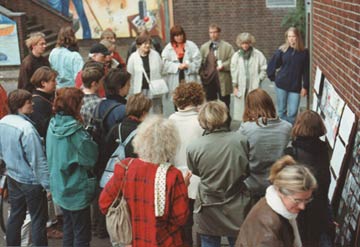
Inauguration and small exhibition
Photo: Hildegund Schuster ©
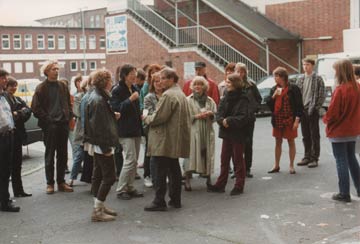
Parents and guests at the inauguration
Photo: Hildegund Schuster ©
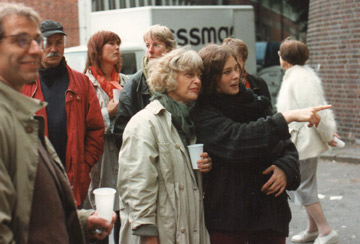
Rebecca with her parents
Photo: Hildegund Schuster ©

